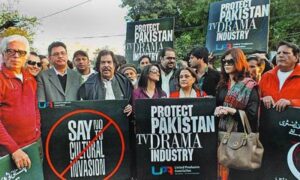Newspaper Article 28/12/2016
Since the advent of globalization, the people living in various corners of the world can easily interact with each other. People can reach out to their near-ones living in a foreign land. This has also led to cultural exchange between different regions/countries. In a way it is a healthy practice to learn from each other’s culture and also spread own values. Culture is being portrayed as an element of soft power and a source of projecting a country’s image globally. It would not be wrong to remark that the factors which determine a player’s international standing are its political values, foreign policy and cultural outlook. To attain desired results in the international arena, a political actor needs to have both the hard power capabilities as well as soft power.
Seeing the cultural trends globally, a global power’s culture is more influential in comparison to developing world, and the people tend to follow the culture of developed countries. For instance, Hollywood is the film industry of the US, Bollywood of India, Lollywood of Pakistan (similarity in name). The role the Indian movies have in projecting India’s burgeoning image is a proven fact. The Indian movies reflect the self-centered mindset, thinking high of themselves and view other South Asian states as satellites or subservients.
Indian movies are being watched in Pakistan. The Indian songs are being played on the weddings. Some Pakistani TV channels have broadcasted Indian dramas. The cultural values which are being projected through the Bollywood movies are in sharp contrast to the teachings of Islam. The element of vulgarity, illicit relationships, violence and abusive language shown in the Indian movies is a spoiler for the youth. The showing in movies that a Pakistani Muslim girl falls in love with an Indian Hindu pilot is to promote the idea of Hindu-Muslim marriages. As per the Islamic teachings, a Muslim woman cannot marry a non-Muslim. The idea to link India and Pakistan culturally is, in actual, a deliberate attempt to misguide the youth. The hidden aim is to discredit the ‘Two Nation Theory’. Thus, India in pursuance of it’s nefarious designs is trying to culturally penetrate in the Pakistani society. Pakistan’s strategic capability makes it a strong regional player, likewise, our dramas and movies should deter the Indian hegemonistic mindset. To counter-balance the negative impact of Indian movies on our culture/society, an appropriate media strategy focusing on balanced ideological ideas needs to be enforced. Historical dramas highlighting the true facts should be aired. This will not only educate the youth but will also address the biases. The movies like ‘Khuda Kay Liye’ is an example of countering militant propaganda. The movie referred to the narrow interpretation of the religion, and how the young minds are misguided. ‘Ramchand Pakistani’ is another movie, in which an eight year old boy crosses the border mistakenly; his father runs after him; both the son and father are caught by Indian security force and jailed for 7 year. Such movies educate the public on religious, political and social issues.
During the 1970s, Pakistan’s national airline PIA was regarded as one of the best in the world. Likewise, sports was another area, which earned Pakistan fame; and the country was also a tourist hub. Later, the regional developments impacted Pakistan domestically as well as internationally. Misperceptions and propaganda further tarnished Pakistan’s image. For image building, there is a need to project the positive aspects of Pakistan. Pakistan is a land of diverse culture, each province has its own language; this diversity is a source of richness and strength. The Indus valley civilization speaks of the rich cultural heritage. The country’s strategic location, dynamic youth force and armed forces are its strengths and need projection for domestic as well as international audiences. Educational exchange programmes with foreign universities is another area which needs consideration. China-Pakistan Economic Corridor (CPEC) is a positive development. The project would enhance connectivity, and open avenues of cultural/educational exchange.
[A version of this article appeared in Pakistan Observer dated 26 December 2016]
Disclaimer: Views expressed are of the writer and are not necessary reflective of IPRI policy.


